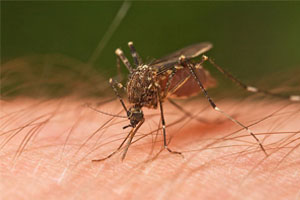Can I apply DEET under my clothes?
1.800.858.7378npic@oregonstate.edu
We're open from 8:00AM to 12:00PM Pacific Time, Mon-Fri
A to Z


While popular as an insect repellent during the spring and summer months, DEET may cause health risks to people who do not follow the label instructions.
A common misapplication involves people wearing clothing over an area of skin that has been treated with DEET. In this scenario, someone may be exposed to a higher amount of the chemical than the EPA has approved. Very often, people don’t wash the product off their skin after returning indoors. This can result in overexposure, especially in cases where a product is applied too often (at short intervals) or daily for several days.
A small amount of DEET is absorbed into the body when applied to the skin. This amount may increase when the treated skin is covered with clothing. The body may also absorb increased levels of DEET when alcohol or sunscreen is also applied to the skin.

DEET Health Risks
DEET is slightly toxic when applied to the skin or swallowed, and practically non-toxic when inhaled. But there are still risks when using it. The risk is higher after repeated misapplications and prolonged exposures.
Being exposed to DEET can cause:
- Skin irritation, redness, rash and swelling
- Eye irritation and pain
- Upset stomach, vomiting and nausea when ingested
Avoiding Misapplications
The most critical step is following all label directions. EPA reviews safety data for every pesticide product sold in the United States, including insect repellents containing DEET. By reading the label, you will find the following language in under 'Directions for Use.'

DO NOT USE UNDER CLOTHING
It is unlawful and potentially dangerous to ignore pesticide label directions. Labels also include information about age restrictions and how long you need to wait to reapply DEET repellent. Remember that applying a product more often can result in skin irritation.
Can I apply DEET under my clothes?
 |
Is it safe to apply DEET repellents? Episode 27 - A specialist discusses the risks of using insect repellants and ways to avoid overexposure. Download and Listen, View Transcript - 2:09 min., 1.3MB |

If you have questions about this, or any pesticide-related topic, please call NPIC at 800-858-7378 (8:00am - 12:00pm PST), or email us at npic@ace.orst.edu.
